Heart of darkness-theme (黑暗之心)
《黑暗之心》中“心”的象征意义

华中师范大学硕士学位论文《黑暗之心》中“心”的象征意义姓名:***申请学位级别:硕士专业:英语语言文学指导教师:***20050501内容摘要约瑟夫·康拉德(1857.1924)是英国十九世纪末二十世纪初一位很有影响力的现代主义作家,生于当时在俄国统治下的波兰东南部。
1862康拉德全家被流放到俄罗斯北部,以致他八岁丧母、十二岁丧父,幸好被叔叔收养才免遭衣食无着的命运。
后来他迷上了航海,经过近十年的摸爬滚打,终于在1888年成了一艘三桅船的船长。
然而,正是儿时的不幸和青年时期的冒险经历给他的写作提供了丰富的素材,《黑暗之心》就是一个很好的例子。
这部以他1890年的刚果之旅为依据创作的作品,讲述的是一个名叫查尔斯-马洛的年轻入沿刚果河进入黑暗的非洲腹地去找寻儿时梦想的故事。
途中马洛被库尔兹的传奇经历所吸引,并将拯救这位垂危的象牙代理人视为此行的另一重要目的。
然而沿途所见的种种“黑暗”以及库尔兹的悲剧使他的梦想彻底破灭,也使得这次寻找“真我”的“心路历程”以失败而告终。
本文的目的在于通过分析“黑暗”之发祥地“心”的象征意义,同时列举小说发表一个多世纪以来种种由“黑暗”之“心”所引发的罪恶与悲剧,说明库尔兹悲剧的必然性,以揭示《黑暗之心》的深刻含义及其对于现代的启示意义。
本文开篇简要介绍了康拉德及其作品在英国文学乃至世界文学史上的重要地位,及其对于20世纪之初一些重要作家的影响。
同时作者介绍了康拉德的艺术观,并大致点评了他的十部最重要的作品:《“白水仙”号上的黑家伙》、《黑暗之心》、《吉姆爷》、《青春》、《台风》、《诺斯特罗莫》、《特务》、《秘密的共命运者》、《在西方的注视下》和《机会》。
部分评论家认为,在康拉德的诸多作品当中,单凭《黑暗之心》或《诺斯特罗莫》就足以赋予他“文坛巨匠”的美誉。
而本文作者尤为欣赏其前一部作品。
原因之一在于故事所包含的深刻蕴意。
另一个重要的原因则在于它从各个层面体现了康拉德的特殊身份和生活经历对其作品内容及主题的重大影响。
现实主义时期英国文学概述

现实主义时期英国文学概述现实主义时期文学(19世纪30年代-1918)1837年维多利亚女王(Queen Victoria, 1819-1901)登基。
在她统治时期,英国一度取得世界贸易和工业的垄断地位,科学、文化、艺术出现繁荣的局面。
维多利亚时代英国诗歌表现出与浪漫主义截然不同的诗风,诗人们不再沉湎于主观感情的发泄,而是注重形式的典雅,对诗艺精益求精。
罗伯特·布朗宁(Robert Browning, 1812-1889)早年从事过戏剧创作,后来专门写戏剧独白。
戏剧独白是一种通过主人公的自白或议论来抒发情感的无韵体诗。
在《皮帕走过了》(Pippa Passes)、《指环与书》(The Ring and the Book)等作品中,诗人带上"面具",进入戏剧人物内心世界,以其口吻娓娓而谈,语言极为生动,说话者跃然纸上。
阿尔弗雷德·丁尼生(Alfred Tennyson, 1809-1892)在他漫长的艺术生涯中创作了大量的抒情诗、哲理诗和叙事诗,诗风凝重、典雅。
丁尼生的剑桥挚友哈勒姆溺水而死,对他诗歌创作产生深远影响。
诗人在挽诗《悼念》(In Memoriam A. H. H)中表达了真切的伤感和悲痛,同时反映了对生活本质和人类命运的思索和忧虑,成为时代的心声。
19世纪中叶,英国经济发展迅速,物质丰富,国力昌盛。
但是资本主义制度所引起的各种社会矛盾十分尖锐,社会主义思潮开始流行,作为西方文明基石的基督教受到科学思想的挑战,日益衰微,在繁荣景象的背后潜伏着焦虑不安的暗流。
马修·阿诺德(Matthew Arnold,1822-1888)敏锐地捕捉到时代的脉搏,在《写于雄伟的卡尔特寺院的诗章》(Stanzas from the Grande Chartreuse)中揭示了人们的处境:"彷徨在两个世界之间,一个已经死去,另一个无力诞生。
"阿诺德是19世纪英国人文主义文学批评的杰出代表,他有关文学与文化的论述对后世影响很大。
浅谈康拉德_黑暗之心_的权势关系_人控制物
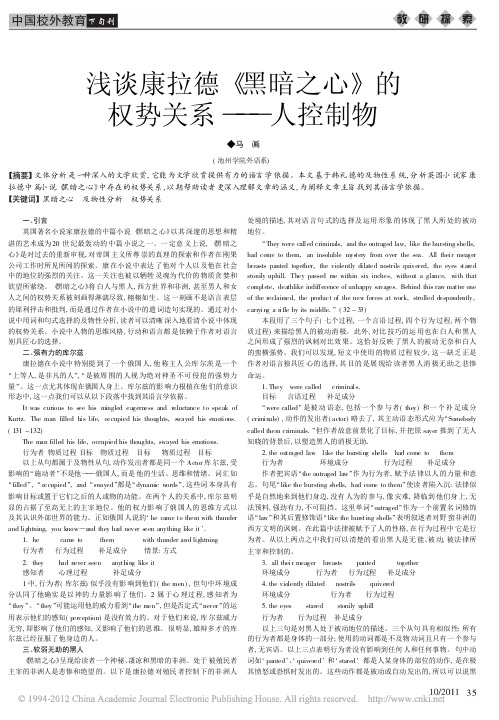
康拉德翻译文学 论文

浅谈黄雨石的翻译著作《黑暗的心》【摘要】本文主要表达了对黄石雨先生翻译的《黑暗的心》进行解读。
从题目翻译,景色描写翻译,人物语言翻译,三方面,对先生的翻译,表达了个人的观点和看法。
其中有部分内容包含其他译者对于《黑暗的心》的翻译,与黄石雨先生的译作进行对比和鉴赏,表达自己的观点。
【关键字】黄石雨康拉德翻译黑暗的心在十九世纪末,二十世纪初的英国文坛上,约瑟夫·康拉德占有一个重要的位置,他不仅是英语世界杰出的作家,而且被认为是西方现代主义文学的先驱之一。
他的小说北京广阔,性格复杂,手法新颖,风格独特,在十九世纪传统小说与二十世纪现代主义小说之间起了承前启后的作用。
其中,《黑暗的心(Heart of Darkness )》在康拉德的作品中,是公认的二十世纪文学经典。
这部作品入选1998 年兰登书屋评选出的“20 世纪100 部英语经典小说”,被认为是小说写作由现实主义向现代主义过渡的代表作品。
关于这部作品的中文译作很多,1982 年第2 期《外国文学季刊》发表了黄雨石翻译的《黑暗的内心深处》,预示着康拉德作品在中国译介第二次高潮的开始。
两年后,该小说经过译者自己全面校改,以《黑暗深处》为书名由百花文艺出版社出版。
这部中篇小说后来还有至少5 个中译本,如《黑暗的心》(智量等译,上海译文出版社,1985 年)和《黑暗的心脏》(王金玲译,小说出版社,1998 年)等。
翻译康拉德的作品有相当的难度,他那带有异国情调的晦涩而优雅的语言与别具一格的叙述手法,使得在翻译过程中难以传达原文的神韵。
在众多翻译版本中,本文认为,黄石雨先生的译本较为恰当,合理,精彩的将康拉德的文学经典展现给中国读者但同时也有一些问题,下面本文将从以下几个方面进行叙述。
一.题目翻译《Heart of Darkness 》有很多种译法。
王金玲先生译为《黑暗的心脏》,黄时雨先生也在初次翻译时,取译名为《黑暗的内心深处》,后改名为《黑暗深处》,最后,定名为《黑暗的心》。
黑暗之心 乔瑟夫康拉德 读后感英文
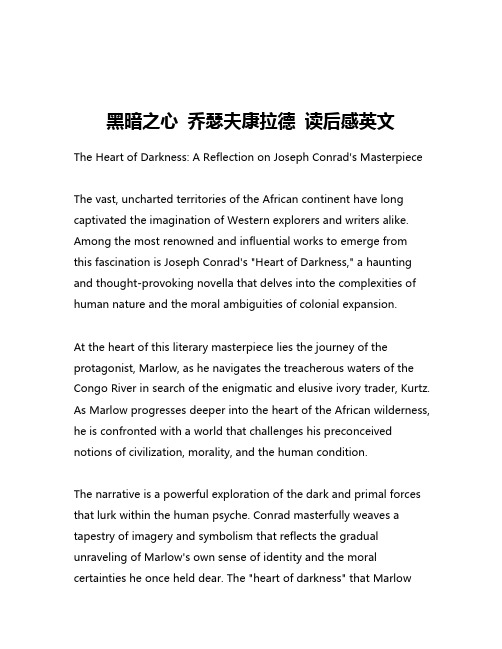
黑暗之心乔瑟夫康拉德读后感英文The Heart of Darkness: A Reflection on Joseph Conrad's MasterpieceThe vast, uncharted territories of the African continent have long captivated the imagination of Western explorers and writers alike. Among the most renowned and influential works to emerge from this fascination is Joseph Conrad's "Heart of Darkness," a haunting and thought-provoking novella that delves into the complexities of human nature and the moral ambiguities of colonial expansion.At the heart of this literary masterpiece lies the journey of the protagonist, Marlow, as he navigates the treacherous waters of the Congo River in search of the enigmatic and elusive ivory trader, Kurtz. As Marlow progresses deeper into the heart of the African wilderness, he is confronted with a world that challenges his preconceived notions of civilization, morality, and the human condition.The narrative is a powerful exploration of the dark and primal forces that lurk within the human psyche. Conrad masterfully weaves a tapestry of imagery and symbolism that reflects the gradual unraveling of Marlow's own sense of identity and the moral certainties he once held dear. The "heart of darkness" that Marlowseeks to uncover is not merely a geographical location, but a metaphorical representation of the savage and unpredictable nature that lies within us all.Through Kurtz, Conrad presents a complex and multifaceted character who embodies the paradoxes and contradictions inherent in the colonial enterprise. Kurtz, once a promising and idealistic young man, has succumbed to the corrupting influence of power and the seductive allure of the wilderness. His descent into madness and moral depravity serves as a cautionary tale, a stark reminder of the fragility of human civilization and the dangers of unchecked ambition and greed.The novel's exploration of the themes of imperialism, racism, and the nature of the human condition resonate profoundly with readers even today. Conrad's vivid descriptions of the African landscape and the brutality of the colonial system serve as a powerful critique of the prevailing attitudes and practices of his time. The author's use of ambiguity and the lack of definitive answers further enhance the work's complexity, inviting readers to engage in a deep and personal reflection on the moral dilemmas presented.One of the most striking aspects of "Heart of Darkness" is the way in which it challenges the reader's own preconceptions and biases. Marlow's journey becomes a metaphor for the reader's ownexploration of the darker aspects of the human psyche. The novel's refusal to provide easy answers or simplistic solutions forces the reader to grapple with the moral ambiguities and the inherent complexity of the human experience.In the end, "Heart of Darkness" stands as a testament to the enduring power of literature to illuminate the human condition and to provoke deep and meaningful contemplation. Conrad's masterful storytelling and his ability to craft a narrative that resonates on multiple levels have cemented the novel's place as a timeless classic of world literature. As readers delve into the heart of this work, they are confronted with the unsettling yet profound realization that the true "heart of darkness" may lie not in the distant reaches of the African continent, but within the depths of their own souls.。
英文专业毕业论文——黑暗的心
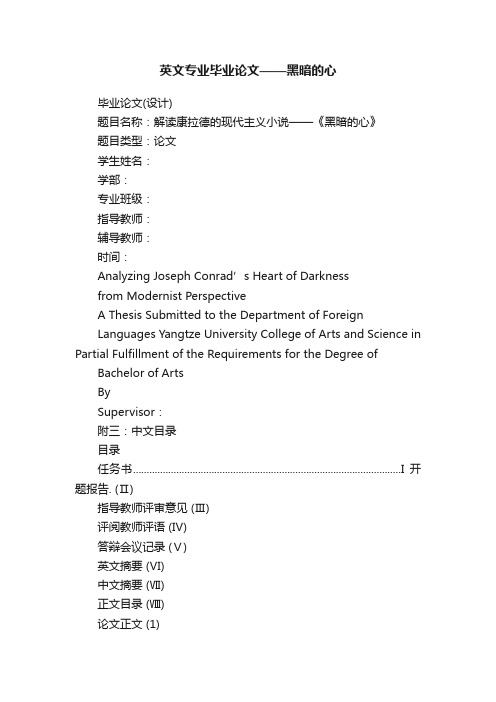
英文专业毕业论文——黑暗的心毕业论文(设计)题目名称:解读康拉德的现代主义小说——《黑暗的心》题目类型:论文学生姓名:学部:专业班级:指导教师:辅导教师:时间:Analyzing Joseph Conrad’s Heart of Darknessfrom Modernist PerspectiveA Thesis Submitted to the Department of ForeignLanguages Yangtze University College of Arts and Science in Partial Fulfillment of the Requirements for the Degree of Bachelor of ArtsBySupervisor:附三:中文目录目录任务书...................................................................................................I 开题报告. (Ⅱ)指导教师评审意见(Ⅲ)评阅教师评语(Ⅳ)答辩会议记录(Ⅴ)英文摘要(Ⅵ)中文摘要(Ⅶ)正文目录(Ⅷ)论文正文 (1)参考文献 (29)致谢 (31)附录一中文翻译 (32)附录二英文原文 (36)毕业论文(设计)任务书学部专业班级学生姓名指导教师/职称1.毕业论文(设计)题目:解读康拉德的现代主义小说-----《黑暗的心》Analyzing Joseph Conrad’s Heart of Darkness from Modernist Perspective2.毕业论文(设计)起止时间:2010年10 月11 日~2011年6月5日3.毕业论文(设计)所需资料及原始数据(指导教师选定部分)[1]Batchelor, John. The Life of Joseph Conrad, [M] Oxford UK & Cambridge USA:Blackwell, 1994.[2]Bradley, Candice.Af rica and Africans in Conrad’s Heart of Darkness, [M] London:Penguin Books Ltd, 2000.[3]Brown, Dennis. The Modernist Self in Twentieth—Century English Literature, [M] NewYork:St. Martin’s Press, 1989.[4]Conrad, Joseph. Heart of Darkness and the End of the Tether, [M] New York:AirmontPublishment Company, 1966.[5]Hampson, Robert. Joseph Conrad:Betrayal and Identity, [M] New York:St.Martin’sPress, 1992.[6]Krajka, Wieslaw. Isolation and Ethos-- Study of JosephConrad, [M] Boulder: EastEuropean Monographs, 1992.[7]Lothe, Jkob. Conrad’s Narrative and Method, [M] Oxford:Clarendon Press, 1989.[8]Peters, John. Conrad and Impressionism, [M] Cambridge:Cambridge University Press,2001.[9]Richetti, John. The Columbia History of the British Novel [M] Beijing: Foreign LanguageTeaching and Resarch Press, 2005.[10]S tape, J. H. The Cambridge Companion to Joseph Conrad, [M] Shanghai: ShanghaiForeign Language Press, 2000.[11]S herry, Norman.Conrad’s Western World, [M] Cambridge:Cambridge University Press,1971.[12]S tringer, Jenny. The Oxford Companion to Twentieth—century Literature in English, [M]Oxford:Oxford University Press, 1996.[13]W att, Ian. Impressionism and Symbolism in Heart of Darkness: A Commendation[M] .London: Macmillan. 1979.[14]侯维瑞, 现代英国小说史,[M] 上海:上海外语教育出版社,1985.[15]李彬, 康拉德《黑暗的心》中的现代主义元素,[J] 河北大学成人教育学院学报,2006(3) :14-16.[16]隋旭升,《黑暗的心脏》中库尔兹和马洛的象征意义,[J]《外国文学评论》,1994 (2):53-67.[17]姚兰,王颖, 试论《黑暗的心》中黑与自的象征意义,[J] 外国文学研究,2003(3):103-117[18]约瑟夫·康拉德黑暗的心灵,[M] 张和龙译,上海:上海外语出版社,1987.4.毕业论文(设计)应完成的主要内容1. 引言部分,介绍康拉德先生的生平事迹及其小说《黑暗的心》的背景和主要内容2. 文献综述3. 现代主义及其在《黑暗的心》中的运用3.1社会作用3.2《黑暗的心》中的叙述手法3.2.1 叙述框架3.2.2 叙述者3.3小说《黑暗的心》中印象主义艺术手法3.3.1康拉德与印象主义3.3.2 《黑暗的心》中对光的描绘3.3.3 《黑暗的心》中对颜色的描绘3.4 小说《黑暗的心》中象征手法的体现3.4.1 象牙的象征意义3.4.2 马洛的旅程的象征意义3.4.3 库尔兹的死亡的象征意义4. 现代主义手法下掩藏的异化、疏离和孤独意识4.1 人物的异化4.1.1 库尔兹4.1.2 弗利斯利文4.1.3 贸易站上的一群工作者4.2 异化导致的人际间的疏离4.2.1性别间的疏离4.2.2 种族间的疏离4.2.3 殖民者间的疏离4.2.4 黑人土著间的疏离4.3 基于疏离而产生的孤独意识4.3.1 库尔兹未婚妻的孤独4.3.2 库尔兹情妇的内心世界的绝望4.3.3 库尔兹临终前的忏悔5. 得出结论:康拉德抨击了殖民主义的黑暗,反映了现代人对世界个体的相对的理解及困惑,其现代主义的艺术手法对主题的表达卓有成效,其艺术价值对现代主义文学意义深远。
heart of darkness《黑暗的心》读书报告PPT精选课件

3. Character
Marlow:The protagonist and main narrator of the story, he stumbles into Africa looking to sail a steamboat and rescuing Kurtz. Russian trader:Kurtz’s devoted companion, he is an idealistic explorer who has wandered to the Congo on a Dutch ship. He is so young that it is uncertain whether or not he fully understands what he is doing in Africa. He is more or less attracted to the glamor oftz’s African mistress:A beautiful woman loaded with jewelry who appears on the shore when Marlow’s steamer arrives at and leaves the Inner Station. She seems to exert an undue influence over both Kurtz and the natives around the station. Like Kurtz, she is an enigma: she never speaks to Marlow, and he never learns anything more about her.
Reading Report of Heart of Darkness
英语美文欣赏:康拉德激情的《青春》
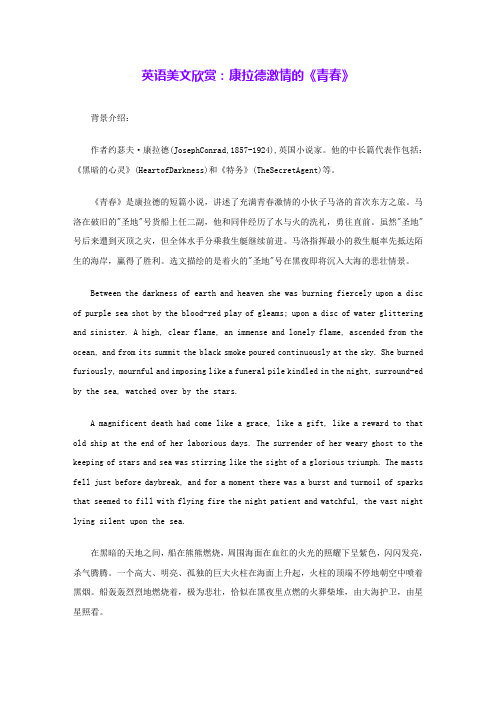
英语美文欣赏:康拉德激情的《青春》背景介绍:作者约瑟夫·康拉德(JosephConrad,1857-1924),英国小说家。
他的中长篇代表作包括:《黑暗的心灵》(HeartofDarkness)和《特务》(TheSecretAgent)等。
《青春》是康拉德的短篇小说,讲述了充满青春激情的小伙子马洛的首次东方之旅。
马洛在破旧的"圣地"号货船上任二副,他和同伴经历了水与火的洗礼,勇往直前。
虽然"圣地"号后来遭到灭顶之灾,但全体水手分乘救生艇继续前进。
马洛指挥最小的救生艇率先抵达陌生的海岸,赢得了胜利。
选文描绘的是着火的"圣地"号在黑夜即将沉入大海的悲壮情景。
Between the darkness of earth and heaven she was burning fiercely upon a disc of purple sea shot by the blood-red play of gleams; upon a disc of water glittering and sinister. A high, clear flame, an immense and lonely flame, ascended from the ocean, and from its summit the black smoke poured continuously at the sky. She burned furiously, mournful and imposing like a funeral pile kindled in the night, surround-ed by the sea, watched over by the stars.A magnificent death had come like a grace, like a gift, like a reward to that old ship at the end of her laborious days. The surrender of her weary ghost to the keeping of stars and sea was stirring like the sight of a glorious triumph. The masts fell just before daybreak, and for a moment there was a burst and turmoil of sparks that seemed to fill with flying fire the night patient and watchful, the vast night lying silent upon the sea.在黑暗的天地之间,船在熊熊燃烧,周围海面在血红的火光的照耀下呈紫色,闪闪发亮,杀气腾腾。
世界名著英文书名大全
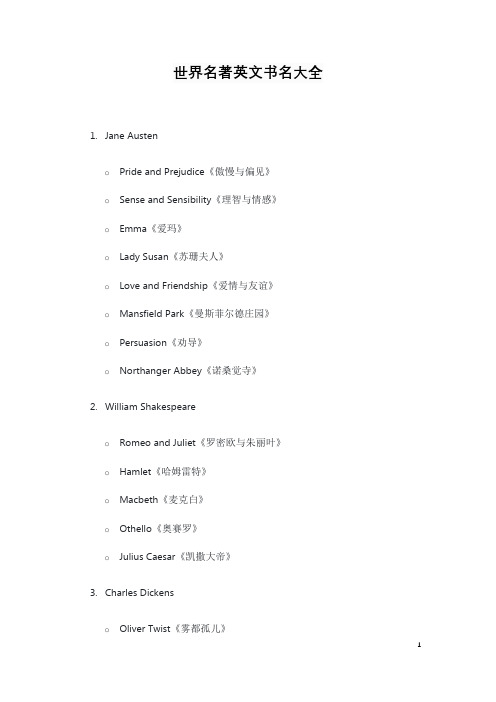
世界名著英文书名大全1.Jane Austeno Pride and Prejudice《傲慢与偏见》o Sense and Sensibility《理智与情感》o Emma《爱玛》o Lady Susan《苏珊夫人》o Love and Friendship《爱情与友谊》o Mansfield Park《曼斯菲尔德庄园》o Persuasion《劝导》o Northanger Abbey《诺桑觉寺》2.William Shakespeareo Romeo and Juliet《罗密欧与朱丽叶》o Hamlet《哈姆雷特》o Macbeth《麦克白》o Othello《奥赛罗》o Julius Caesar《凯撒大帝》3.Charles Dickenso Oliver Twist《雾都孤儿》o A Tale of Two Cities《双城记》o Great Expectations《远大前程》o David Copperfield《大卫·科波菲尔》4.George Orwello Animal Farm《动物农场》o1984《一九八四》5.Fyodor Dostoevsky (俄国)o Crime and Punishment《罪与罚》o The Brothers Karamazov《卡拉马佐夫兄弟》o Notes from Underground《地下室手记》6.Leo Tolstoy (俄国)o War and Peace《战争与和平》o Anna Karenina《安娜·卡列尼娜》7.Victor Hugo (法国)o Les Misérables《悲惨世界》o Notre-Dame de Paris《巴黎圣母院》8.Gabriel Garcia Marquez (哥伦比亚)o One Hundred Years of Solitude《百年孤独》9.Ernest Hemingway (美国)o The Old Man and the Sea《老人与海》o A Farewell to Arms《永别了武器》10.Herman Melville (美国)o Moby Dick《白鲸》11.Mark Twain (美国)o Adventures of Huckleberry Finn《哈克贝利·芬历险记》o The Adventures of Tom Sawyer《汤姆·索亚历险记》12.J.D. Salinger (美国)o The Catcher in the Rye《麦田里的守望者》13.Ernest Hemingway (美国)(补充)o For Whom the Bell Tolls《丧钟为谁而鸣》14.Franz Kafka (捷克)o The Metamorphosis《变形记》o The Trial《审判》15.Jane Eyre (英国, 作者:Charlotte Bronte)o Jane Eyre《简·爱》16.Emily Bronte (英国)o Wuthering Heights《呼啸山庄》17.Gustave Flaubert (法国)o Madame Bovary《包法利夫人》18.F. Scott Fitzgerald (美国)o The Great Gatsby《了不起的盖茨比》19.Thomas Mann (德国)o Death in Venice《威尼斯之死》o Buddenbrooks《布登勃洛克一家》20.Gabriel Garcia Marquez (哥伦比亚)(补充)o Love in the Time of Cholera《霍乱时期的爱情》21.J.K. Rowling (英国)o Harry Potter and the Philosopher's Stone《哈利·波特与魔法石》22.Albert Camus (法国)o The Plague《鼠疫》o The Stranger《局外人》23.Virginia Woolf (英国)o Mrs. Dalloway《达洛维夫人》o To the Lighthouse《到灯塔去》24.Joseph Conrad (波兰裔英国)o Heart of Darkness《黑暗之心》o Lord Jim《吉姆爷》25.Antoine de Saint-Exupéry (法国)o The Little Prince《小王子》26.Haruki Murakami (日本)o Norwegian Wood《挪威的森林》o Kafka on the Shore《海边的卡夫卡》27.Chinua Achebe (尼日利亚)o Things Fall Apart《瓦解》28.Jack Kerouac (美国)o On the Road《在路上》29.Isabel Allende (智利)o The House of the Spirits《幽灵之家》30.Mario Puzo (美国)o The Godfather《教父》31.Arthur Conan Doyle (英国)o The Adventures of Sherlock Holmes《福尔摩斯探案集》32.William Golding (英国)o Lord of the Flies《蝇王》33.Virginia Woolf (英国)(补充)o Orlando: A Biography《奥兰多》34.Gabriel Garcia Marquez (哥伦比亚)(补充)o Love in the Time of Cholera《霍乱时期的爱情》35.Toni Morrison (美国)o Beloved《宠儿》o Song of Solomon《所罗门之歌》36.Ernest Hemingway (美国)(补充)o The Sun Also Rises《太阳照常升起》37.Italo Calvino (意大利)o Invisible Cities《看不见的城市》o If on a winter's night a traveler《如果在冬夜,一个旅人》38.Hermann Hesse (德国)o Siddhartha《悉达多》o Steppenwolf《荒原狼》39.Mikhail Bulgakov (俄罗斯)o The Master and Margarita《大师与玛格丽特》40.Alice Walker (美国)o The Color Purple《紫色》41.John Steinbeck (美国)o The Grapes of Wrath《愤怒的葡萄》o Of Mice and Men《人鼠之间》42.Agatha Christie (英国)o Murder on the Orient Express《东方快车谋杀案》o And Then There Were None《无人生还》43.D.H. Lawrence (英国)o Lady Chatterley's Lover《查泰莱夫人的情人》o Sons and Lovers《儿子与情人》44.Albert Camus (法国)(补充)o The Myth of Sisyphus《西西弗斯的神话》45.William Faulkner (美国)o The Sound and the Fury《喧哗与骚动》o As I Lay Dying《我弥留之际》46.Paulo Coelho (巴西)o The Alchemist《牧羊少年奇幻之旅》47.J.R.R. Tolkien (英国)o The Lord of the Rings《魔戒》三部曲o The Hobbit《霍比特人》48.Umberto Eco (意大利)o The Name of the Rose《玫瑰的名字》49.Ken Kesey (美国)o One Flew Over the Cuckoo's Nest《飞越疯人院》50.Gabriel Garcia Marquez (哥伦比亚)(补充)o Chronicle of a Death Foretold《预知死亡纪事》51.Arundhati Roy (印度)o The God of Small Things《微物之神》52.Naguib Mahfouz (埃及)o Palace Walk《宫间街》o Children of Gebelawi《贾贝尔阿维的孩子们》53.Chimamanda Ngozi Adichie (尼日利亚)o Half of a Yellow Sun《半轮黄日》o Americanah《美国佬》54.Chinua Achebe (尼日利亚)(补充)o Arrow of God《上帝之箭》55.Octavia Butler (美国)o Kindred《血族》an Kundera (捷克)o The Unbearable Lightness of Being《生命中不能承受之轻》57.Kazuo Ishiguro (日本裔英国)o Never Let Me Go《别让我走》o The Remains of the Day《长日将尽》58.Isabel Allende (智利)(补充)o Paula《宝拉》59.Jean-Paul Sartre (法国)o Nausea《恶心》o No Exit《禁闭》60.Günter Grass (德国)o The Tin Drum《铁皮鼓》。
库尔茨的两面性探析——从叙事学角度解读《黑暗之心》

库尔茨的两面性探析——从叙事学角度解读《黑暗之心》摘要:英国的小说家康拉德的代表作《黑暗之心》一反传统小说叙事结构,创立了故事中套故事的新叙事手法,作者通过这一叙事手法,在小说里精心设计了两个身兼多职的叙述者——马洛和匿名的“我”,极大地增强了小说的艺术表现力和感染力。
论文从叙事学角度分析两位叙述者在文本中扮演的角色,以说明两位叙述者都对作者揭示以库尔茨为代表的西方殖民者的两面性起到了至关重要的作用。
关键词:库尔茨;身兼多职的叙述者;两面性;叙事学英国作家康拉德的著名小说《黑暗的心》(Heart of Darkness)自问世以来,就受到读者和批评家的广泛关注,这部小说曾一度被誉为英国文学史上“最优秀的短篇小说之一”[1]。
在这部小说中,康拉德一改传统的全知全能的叙述手法,采用了框架故事叙事的方法(即故事中套故事的叙述手法),这一叙述手法成为表现文章主题的重要手段。
小说的主要叙述者马洛和“我”在故事中都是身兼多职的叙述者:马洛在故事集叙述者、评论者和参与者于一身;“我”不仅是故事的叙述者还是马洛的忠实听众和评论者,也是隐含的读者。
除此之外,小说中还有3个相对次要的叙述者(会计、经理、俄国青年),使这部小说具有了“复调式小说”的韵味。
正是2位身兼多职的叙述者使得康拉德的小说具有了元叙事的特征,也正是这一反传统的叙述手法让主人公马洛的非洲探险之旅与揭示殖民主义者代表库尔茨的两面性完美地结合起来。
本文从叙事角度分析《黑暗之心》的反传统叙事技巧,以说明2位多身份叙述者对揭示资本主义殖民者的两面性的重要作用。
一主要叙述者马洛和3个次要叙述者对库尔茨两面性的揭示作用小说讲述的是主人公水手马洛(Marlow)从欧洲出发到非洲内陆寻找象牙商人库尔兹的经历,文本描述了在寻找过程中马洛对库尔茨看法变化的心路历程。
马洛沿着刚果河深入非洲腹地的旅程也是深入库尔茨内心黑暗之处的过程。
马洛曾受雇于一家疯狂掠夺刚果财富的比利时贸易公司,驾船经过数月的航行,执着地寻找该公司最好的代理人——库尔茨(Kurtz)。
英国文学选读重点
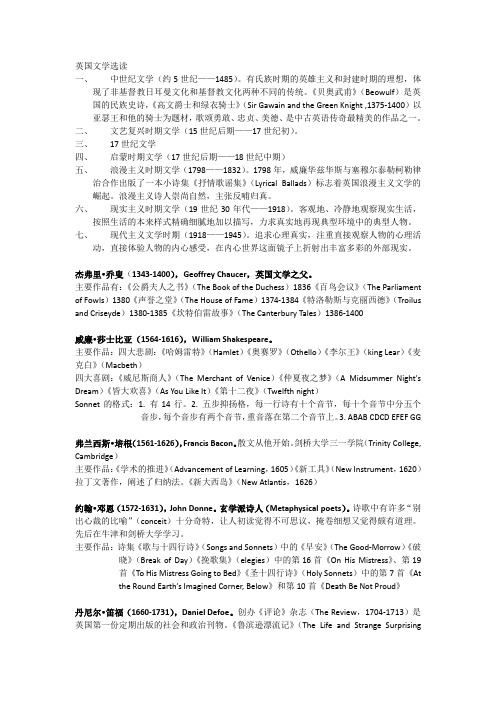
英国文学选读一、中世纪文学(约5世纪——1485)。
有氏族时期的英雄主义和封建时期的理想,体现了非基督教日耳曼文化和基督教文化两种不同的传统。
《贝奥武甫》(Beowulf)是英国的民族史诗,《高文爵士和绿衣骑士》(Sir Gawain and the Green Knight ,1375-1400)以亚瑟王和他的骑士为题材,歌颂勇敢、忠贞、美德、是中古英语传奇最精美的作品之一。
二、文艺复兴时期文学(15世纪后期——17世纪初)。
三、17世纪文学四、启蒙时期文学(17世纪后期——18世纪中期)五、浪漫主义时期文学(1798——1832)。
1798年,威廉华兹华斯与塞穆尔泰勒柯勒律治合作出版了一本小诗集《抒情歌谣集》(Lyrical Ballads)标志着英国浪漫主义文学的崛起。
浪漫主义诗人崇尚自然,主张反哺归真。
六、现实主义时期文学(19世纪30年代——1918)。
客观地、冷静地观察现实生活,按照生活的本来样式精确细腻地加以描写,力求真实地再现典型环境中的典型人物。
七、现代主义文学时期(1918——1945)。
追求心理真实,注重直接观察人物的心理活动,直接体验人物的内心感受,在内心世界这面镜子上折射出丰富多彩的外部现实。
杰弗里•乔叟(1343-1400),Geoffrey Chaucer,英国文学之父。
主要作品有:《公爵夫人之书》(The Book of the Duchess)1836《百鸟会议》(The Parliament of Fowls)1380《声誉之堂》(The House of Fame)1374-1384《特洛勒斯与克丽西德》(Troilus and Criseyde)1380-1385《坎特伯雷故事》(The Canterbury Tales)1386-1400威廉•莎士比亚(1564-1616),William Shakespeare。
主要作品:四大悲剧:《哈姆雷特》(Hamlet)《奥赛罗》(Othello)《李尔王》(king Lear)《麦克白》(Macbeth)四大喜剧:《威尼斯商人》(The Merchant of Venice)《仲夏夜之梦》(A Midsummer Night's Dream)《皆大欢喜》(As You Like It)《第十二夜》(Twelfth night)Sonnet的格式:1. 有14行。
【英语论文】康拉德《黑暗之心》中柯兹的人性分析Kurtz’s Nature In the Darkness
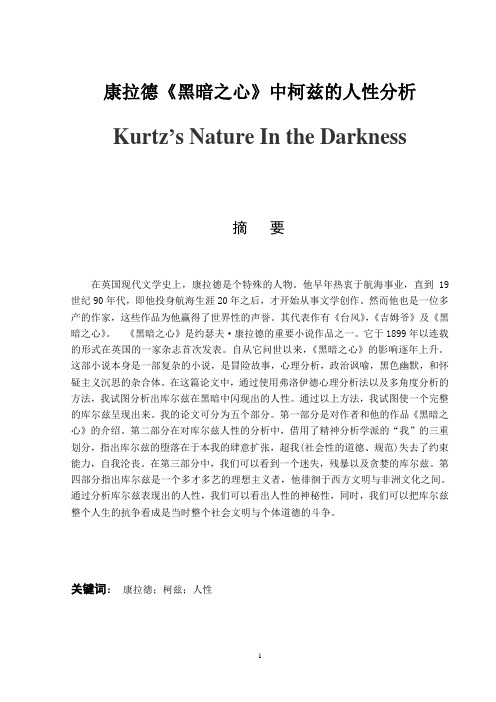
康拉德《黑暗之心》中柯兹的人性分析Kurtz’s Nature In the Darkness摘要在英国现代文学史上,康拉德是个特殊的人物。
他早年热衷于航海事业,直到19世纪90年代,即他投身航海生涯20年之后,才开始从事文学创作。
然而他也是一位多产的作家,这些作品为他赢得了世界性的声誉。
其代表作有《台风》,《吉姆爷》及《黑暗之心》。
《黑暗之心》是约瑟夫·康拉德的重要小说作品之一。
它于1899年以连载的形式在英国的一家杂志首次发表。
自从它问世以来,《黑暗之心》的影响逐年上升。
这部小说本身是一部复杂的小说,是冒险故事,心理分析,政治讽喻,黑色幽默,和怀疑主义沉思的杂合体。
在这篇论文中,通过使用弗洛伊德心理分析法以及多角度分析的方法,我试图分析出库尔兹在黑暗中闪现出的人性。
通过以上方法,我试图使一个完整的库尔兹呈现出来。
我的论文可分为五个部分。
第一部分是对作者和他的作品《黑暗之心》的介绍。
第二部分在对库尔兹人性的分析中,借用了精神分析学派的“我”的三重划分,指出库尔兹的堕落在于本我的肆意扩张,超我(社会性的道德、规范)失去了约束能力,自我沦丧。
在第三部分中,我们可以看到一个迷失,残暴以及贪婪的库尔兹。
第四部分指出库尔兹是一个多才多艺的理想主义者,他徘徊于西方文明与非洲文化之间。
通过分析库尔兹表现出的人性,我们可以看出人性的神秘性,同时,我们可以把库尔兹整个人生的抗争看成是当时整个社会文明与个体道德的斗争。
关键词:康拉德;柯兹;人性AbstractIn English literature, Conrad is a special man. As a young man, he is fond of sailing. He is not engaged in the literature until the 90’s in 19th century. However, he writes many novels and gets the world prestige. His representative works are Lord Jim,Nostromo and Heart of Darkness. Heart of Darkness is one of Joseph Conrad's celebrated novels. It was first serialized in Blackwood's Edinburgh Magazine in 1899. Since its publication, Heart of Darkness has become progressively more influential during the following decades. Heart of Darkness itself is a complicated novel, since it is a mixture of adventure story, psychological case study, political satire, black humor comedy, and skeptical meditation. In the paper, I try to present Kurtz 's nature in the darkness, using Freudian psycho analysis and multi-angles analysis. With those approaches, I try to show an intact Kurtz. My paper can be divided into five parts. The first part is the introduction to Joseph Conrad and his novel Heart of Darkness. In the second part, this thesis borrows the three layers' division of "I'' in psycho analytics. This thesis indicates that the degeneration of Kurtz lies in his wantonly expanded ego while as his superego (social moral and regulation) lost binding force and his ego was mined. In the third part, we find a lost, cruel and greedy Kurtz. The fourth part presents a versatile idealist who stands between Western civilization and African culture. By analyzing Kurtz 's nature, we can find the mystery of human nature and the conflict of social civilization and individual moral. The fifth part is conclusion.Key Words: Conrad; Kurtz; natureIntroductionJoseph Conrad did not begin to learn English until he was 21 years old. He was born Jozef Teodor Konrad Korzeniowski on December 3, 1857, in Polish Ukraine. When Conrad was quite young, his father was exiled to Siberia on suspicion of plotting against the Russian government. After the death of the boy’s mother, Conrad’s father sent him to his mother’s brother in Kraków to be educated, and Conrad never again saw his father. He traveled to Marseilles when he was seventeen and spent the next twenty years as a sailor. He went to an English ship in 1878, and eight years later he became a British subject. In 1889, he began his first novel, Almayer’s Folly,and began actively searching for a way to fulfill his boyhood dream of traveling to the Congo. He took command of a steamship in the Belgian Congo in 1890, and his experiences in the Congo came to provide the outline for Heart of Darkness. Conrad’s time in Africa wreaked havoc on his health, however, and he returned to England to recover. He returned to sea twice before finishing Almayer’s Folly in 1894 and wrote several other books, including one about Marlow called Youth: A Narrative before beginning Heart of Darkness in 1898. He wrote most of his other major works—including Lord Jim, which also features Marlow, Nostromo, and The Secret Agent, as well as several collaborations with Ford Madox Ford—during the following two decades. Conrad died in 1924.Heart of Darkness, one of the most famous jungle novels, is created on the basis of C onrad’s diary in 1890 when he was on the journey to Congo. On a cruising yawl at rest on Thames, the narrator, Marlow is telling his story about his travel along another river and the legend of an agent down in the jungle. He is appointed by a company that gathers ivory in Congo. Even though the journey seems quite arduous and somewhat elusive, Marlow, who has always had a passion for travel and exploration, sets out his adventure. From beginning to end, what he sees and hears are the dark Africa where the trade agents are greedily gathering ivory, seizing and grabbing the natives brutally. Especially when he witnesses the fable about Kurtz. As a well-educated white, Kurtz, who has the talent of eloquence as his trump card, is arbitrarily ruling his empire but blindly worshipped by the natives as a saint. The works provides a bridge between Victorian values and the ideals of modernism. Like much of the best modernist literature produced in the early decades of the twentieth century, Heart of Darkness is as much about alienation, confusion, and profound doubt as it is about imperialism. Imperialism is nevertheless at the center of Heart of Darkness.By the 1890s,and the major European powers were stretched thin, trying to administer and protect massive, far-flung empires. Cracks were beginning to appear in the system: riots, wars, and the wholesale abandonment of commercial enterprises all threatened the white men living in the distant corners of empires. Things were clearly falling apart. Heart of Darkness suggests that this is the natural result when men are allowed to operate outside a social system of checks and balances: power, especially power over other human beings, inevitably corrupts. At the same time, this begs the question of whether it is possible to call an individual insane or wrong when he is part of a system that is so thoroughly corrupted and corrupting. Heart of Darkness, thus, at its most abstract level, is a narrative about the difficulty of understanding the world beyond the self, about the ability of one man to judge another.Darkness is the theme of this story. It is the clue to find out the context of the story. Conrad makes an integral connection between mind, body and nature by this application. Darkness is also the color of the places where explores and colonialists settled, and the color of the black’s skin. In contrast to the darkness, the white seems extremely outstanding. But inside their white skin, the colonists have a heart of profound darkness, evil and dread.1 Id, superego, ego of Kurtz by psycho analysis1.1 Definitions of termsThis thesis intends to make a Freudian psycho analysis of Kurtz’ s nature in the darkness in terms of Sigmund Freud's theory---the structures of mind. Therefore, it is necessary to make clear two definitions: Freudian and psychoanalysis first of all. Freud, is the recognized founder of modern psychoanalysis, who has exerted an influence far beyond his own field. His theory of the workings of human mind and its descriptive terminology find application in almost all branches of humanities and social sciences. Psychoanalysis is a systematic structure of theories concerning the relation of conscious psychological processes. Or it is a technical procedure for investigating unconscious mental processes. Psychoanalytic theory is Freud's theory that the origin of personality lies in the balance between the id, the ego, and the superego. One's personality is the total sum of all of the ways of acting, thinking, and feeling that are typical for that person and make that person different from all other individuals.1.2 Three structures of mind---the id, the ego, and the superegoThe 1926 edition of The Encyclopedia Britannica described Freud's concept of the elements of personality as follows:The mental apparatus is composed of the "id," which is the reservoir of the instructive impulses, of the "ego" which is the most superficial portion of the id and the one which is modified by the influences of the external world, and of the "super-ego," which develops out of the id, dominates the ego and represents the inhibition of instinct characteristic of man.The id, according to Freud, is the inborn part of the unconscious mind that uses the primary process to satisfy its needs and that acts according to the pleasure principle. Someone further explains that the id is a cauldron of seething excitement. In the id, there is nothing corresponding to the idea of time, no recognition of the passage of time. The id knows no values, no good and evil, no morality, and blindly strives to gratify its instincts in complete disregard of the superior strength of outside forces.In his essay "The Ego and the Id", Freud presents the id as follows: an individual is looked upon as a psychical id, unknown and unconscious. The id attracts all kinds of instinctive forces in order to find their mental representation. The instincts in the id press for immediate satisfaction, regardless of all else, and in this way either fail of achievement or actually do damage. From the point of view of instinctive control, of morality, it may be saidas the "self' or "I," which perceives, remembers, evaluates, plans, and in other ways is responsive to and acts in the surrounding physical and social world. The 1974 edition of Encyclopedic World Dictionary defines it as "that part of the psychic apparatus which experiences the outside world and reacts to it, thus mediating between the primitive drives of the id and the demands of the social and physical environment." While someone points out why the ego is formed, that's because the id has to find realistic ways of meeting its needs and avoiding trouble caused by selfish and aggressive behavior. The ego operates according to the reality principle. The ego can be thought of as the executive of the personality because it uses its cognitive abilities to manage and control the id and balance its desires against the restrictions of reality and the superego.According to Freud, the ego is that part of the id which has been modified by the direct influence of the external world. It seeks to bring the influence of the external world to bear upon the id and its tendencies, and endeavors to substitute the reality principle for the pleasure principle which reigns unrestrictedly in the id. It strives to be moral, representing what may be called reason and common sense, in contrast to the id, which contains the passions. The ego is placing itself at the service of the opposing instinctual impulses. It is the representative of the external world to the id. And it tries to mediate between the world and the id. When the ego finds itself in an excessive real danger, where it believes itself unable to overcome by its own strength, it sees itself deserted by all protecting forces and makes itself die.The superego holds up certain norms of behavior, and does not regard to any difficulties coming from the id and the external world. It is the part of the mind that opposes the desires of the id by enforcing moral restrictions and by striving to attain a goal of "ideal" perfection. The Encyclopedic World Dictionary defines it as "that part of the psychic apparatus which mediates between ego drives and social ideals, acting as a conscience, which may be partly conscious and partly unconscious." In other’s angle, the superego represents the internalization of parental standards and authority. In the normal male child, it replaces the Oedipal desire for the mother. The developing superego thus absorbs the traditions of the family and the surrounding society, serving chiefly to control sexual and aggressive impulses that threaten social structures.In his "The Ego and the Id", Freud assumes the existence of a grade in the ego, a differentiation within the ego, which may be called the "ego ideal" or "superego". The superego derives from the first object of the id, from the Oedipus complex. The ego ideal has the task of repressing the Oedipus wishes. Therefore, the superego "retains the character of the father." Freud points out that the ego ideal is the heir of the Oedipus complex, that it is also the expression of the most powerful impulses and most important libidinal vicissitudes of the id, and that it exercises the moral censorship in the form of conscience. It can besuper-moral and then become as cruel as only the id can be. Then how is it that the superego develops such extraordinary harshness and seve rity towards the ego? Freud proposes, “The excessively strong superego which has obtained a hold upon consciousness rages against the ego with merciless violence. The destructive component had entrenched itself in the superego and turned against the ego.”What is the relationship between the id, the ego and the superego? "The ego is a poor creature owning service to three masters and consequently menaced by three dangers: from the external world, from the libido of the id, and from the severity of the superego." It has to reconcile between the id and the external world, to make the id pliable to the world and to make the world fall in with the wishes of the id. Whenever possible, it tries to remain on good terms with the id; it pretends that the id is showing obedience to the admonitions of reality, even when in fact it is remaining obstinate and unyielding; it disguises the id's conflicts with reality and, if possible, its conflicts with the superego too.In my thesis, I will apply the theories of the id, the ego, and the superego to the psycho analysis of Kurtz’ s nature.1.3 The application of the psycho analysisIn civilized society, on the basis of the superego, the ego harmonizes the relationship between the id and society, so people's id can only be satisfied to a certain extent. In Europe, Kurtz lives in the civilized society. Everything is set in a formed way which assumes the implement of civilization. He grows up in the atmosphere and acts according to the accepted yardstick. When he has no money, his id drove him to get money. But he will not rob from others because of the existence of the superego. In such condition, the ego can deal with the relationship between the id and the superego well. In Africa, when people are far away from the civilized s ociety, in order to meet the id’s demand, they will act by any kind of means. Colonists can do anything they want to do. They ignored the superego and did things at will. There also existed the conflict between white colonists apart from the contradiction between the black and the white. Kurtz was a great man in the Congo River. After being far away from the ethic of the civilized society, the function of the id was greater and greater .As we know, the desire of the id is limitless and he was totally controlled by the id in the end. The following state is that Kurtz regarded himself as the dominator and the desire of going in for the ivory was more endless. In order to take the ivory, he put the local’s heads on the guardrail to warn the public after massacring the local in large quantities. Marlow wrote: " I have no opinion on that point, but I want you clearly to understand that there was nothing exactly profitable in these heads being there. They only showed that Mr. Kurtz lackedhim—some small matter which, when the pressing need arose, could not be found under his magnificent eloquence. Whether he knew of this deficiency himself I can't say."1The description displays Kurtz’s miserliness along with the expansion of the id. From his last words “the horror, the horror”2, I think the knowledge came to him at last—only at the very last. But the wilderness had found him out early, and had carried out a terrible vengeance for the fantastic invasion. I think that it had whispered to him things about himself which he did not know and the whisper had proved irresistibly to be fascinating. It echoed loudly within him because he was hollow at the core. A follower of Kurtz said " This man suffered too much. He hated all this, and somehow he couldn't get away. When I had a chance I begged him to try and leave while there was time; I offered to go back with him. And he would say yes, and then he would remain; go off on another ivory hunt; disappear for weeks; forget himself amongst these people—forget himself—you know." 3Kurtz forgot himself, which means he lost himself and the ego didn’t work any more. Though he wanted to return to the civilized society very much, he cannot get rid of the control of the id. In the end, he was unable to flee from Africa. Appearance of Marlow wanted to draw Kurtz back to the civilized society, though within short time. His desperate cry expressed that he had already understood the evil completely, but he was unable to change his own destiny. His final result of destiny was the inevitable consequence, which was caused by the expansion of the id in the human natural instincts. Without doubt, another reason is the depletion of the superego.In the novel, Conrad did not make us know the destructive effect of the id, but show us the existence of the ego. We will explore the ego of Kurtz in Marlow’s view. Marlow was described as another Kurtz. They understood and trusted each other. Marlow’s road to Kurtz can also be thought to be the road to finding himself. Apart from the dark side, Conrad wants to express a positive view of life by portraying Marlow. From beginning to end, Marlow put the ego in the right place, so he kept himself under the control of reason and never lost himself. Marlow realised that the Congo River had ineluctable magic power, which brought the enlargement of the id. From Kurtz, Marlow knows the effect of the id and brings the ego into play. He never lost himself in the remote uncivilized forest. Marlow got regeneration after going through one shake, but Kurtz moved towards extinction under the control of the id.1/toc/modeng/public/ConDark.html2/toc/modeng/public/ConDark.html2 Kurtz in the center of darkness2.1 Helpless man in the indifferent worldIt is said that each person is alone and without assistance in a monstrous silence, and his presence is simply an accident in the universe where everything is superfluous. As a common person, we have to face the inevitability of death, the necessity of working for a living, and everything known and unknown. With the development of the modern sciences, man possesses more and more advanced technologies and knows more and more about the universe. Yet he sees more and more his own limitation as well. He sees now clearly how small and powerless and of no importance he himself is, compared with the vastness of the universe and all kinds of powerful instruments that man himself invents. The idea that man is the primate of the highest order and God has created everything in the world just for the service of man appears false and could not support itself any more. Thus man feels lost and has to study himself once again and tries to find out his own position in the universe and his own identity. Industrialism, science, new philosophy of life based upon science, social problems, and the wars between European countries made people feel the world was out of order and in chaos. Living in a cold, indifferent, and essentially Godless world, man was no longer free in any sense of the word. He was completely thrown upon himself for survival. People cannot hope to fall back on divine help and guide, and feel irretrievably lost. Life just became a struggle for survival. Thus a self-conscious movement with its belief that the world is absurd and life is meaningless came into being. Heart of Darkness reveals to the author of this thesis that Conrad observes the relationship between man and the world just in the same way as the twentieth-century existentialists do. In this novella he has Kurtz describe an existential world, “the earth … is a place … where we must put up with sights, with sounds, with smells … —breathe dead hippo, so to speak, and not be contaminated”1. Nature usually appears as an opposite force which fights against man constantly in the novel. To Kurtz ,the universe is purposeless and indifferent to human wish to which all his experience points to. Kurtz was described as a man that was not rich enough, so his engagement with a girl was disapproved by her parents. The hurt man tried to realize his own value in a remote and hostile environment. During the struggle against the wilderness, he exhausted himself. Before death, he was left alone and only the laugh of wilderness existed around him. In the heart of a conquering darkness, “It was a moment of triumph for the wildern ess, an invading and vengeful rush which, it seemed to me, I would have to keep back alone for the salvation ofanother soul. And the memory of what I had heard him say afar there, with the horned shapes stirring at my back, in the glow of fires, within the patient woods, those broken phrases came back to me, were heard again in their ominous and terrifying simplicity.”1And in this indifferent world, human actions to Kurtz are always restricted, frustrated and stopped right in the air. Apart from his own restriction, like poverty and physical health, he had to go into the forest and communicated with the local people. In the meantime, Kurtz had to deal with his companions. It is no wonder that Marlow comments in the story “we live, as we dream-alone.”22.2 Degeneration“I could see the cage of his ribs all astir, the bones of his arm waving. It was as though an animated image of death carved out of old ivory had been shaking its hand with menaces at a motionless crowd of men made of dark and glittering bronze. I saw him open his mouth wide—it gave him a weirdly voracious aspect, as though he had wanted to swallow all the air, all the earth, all the men before him. You should have heard him say, `My ivory.’ Oh, yes, I heard him. `My Intended, my ivory, my station, river, my---’everything belonged to him." 3 Here Marlow is talking about a voracious and weird Kurtz, a man driven by a hunger to engorge the universe. The fiction displays the conqueror who despoils the planet he craves to possess, and points to his fate as victim of its terrible vengeance for the fantastic invasion.In the descriptive paragraphs related to Kurtz, we find him a real mysterious, cruel, greedy figure. When Marlow first caught sight of Kurtz's surroundings through his glasses, he sees the slope of a hill interspersed with rare trees and perfectly free from undergrowth. A long decaying building on the summit is half buried in the high grass. And near the house half-a-dozen slim posts remains in a row, roughly trimmed, and with their upper ends ornamented with round carved balls. When getting nearer Kurtz, Marlow takes up his binoculars again, looks at the shore and had a clear view of the ornamented upper ends of the posts: "They would have been even more impressive, those heads on the stakes, if their faces had not been turned to the house. Only one, the first I had made out, was facing my way. I was not so shocked as you may think. The start back I had given was really nothing but a movement of surprise. I had expected to see a knob of wood there, you know. I returned deliberately to the first I had seen---- and there it was, black, dried, sunken, with closed eyelids-a head that seemed to sleep at the top of that pole, and with the shrunken dry lips showing a narrow white line of the teeth, was smiling, too, smiling continuously at some1/toc/modeng/public/ConDark.html2/toc/modeng/public/ConDark.htmlendless and jocose dream of that eternal slumber."1From these descriptions, we obtain a clear vision of a cruel and totally corrupted Kurtz like the decaying building and ruined house. For more ivory he could do anything as the harlequin Russian, the man of patches says: “Nothing on earth to prevent him killing whom and there was he jolly well pleased. And it was true, too.” These heads are the heads of the "rebels" who stand in the way of his ivory obtaining. This is the Kurtz, an ivory-stricken demoniac Kurtz. The opening paragraph of his report about the "suppression of savage customs" is most representative to show his white supremacy. He began with the argument that “We white, from the point of development we had arrived at, must appear to them savages. In the nature of supernatural beings, we approach them with the might as of a deity. By the simple exercise of our will, we can exert a power for good practically unbounded, etc.” 2What we read from Kurtz are very complicated feelings of the author. Like what we have read from Marlow, Kurtz is another evidence of Conrad's conflicting visions, because he is both marvelous for all his good qualities as a white man, and malicious for his lack of restraint in an alien culture.3 A desolate messenger3.1 A talent.In the works, Kurtz is described as a perfect talent, which can be reflected in many aspects. His mother is half-English and his father is half-French. Advanced European civilization provides well educational situation for him. “All Europe contributed to the making of K urtz.”1He is a remarkable politician with outstanding eloquence. “The point was in his being a gifted creature, and that of all his gifts the one that stood out pre-eminently, that carried with it a sense of real presence, was his ability to talk, his words—the gift of expression, the bewildering, the illuminating, the most exalted and the most contemptible, the pulsating stream of light, or the deceitful flow from the heart of an imp enetrable darkness.”2 Kurtz is also very good at trade. With the great moral crusade of bringing lights to the backward people of the world, he became a first-class agent, who was in charge of a very important trading post. The ivory he sent in is as much as all the others put together.In contrast with Kurtz, the manager is described as a fool. The manager got his position just because he was never ill in the remote and hos tile environment. “He had served three terms of three years out there . . . Because triumphant health in the general route of constitutions is a kind of power in itself. When he went home on leave he rioted on a large scale—pompously. Jack ashore—with a difference—in externals only. This one could gather from his casual talk. He originated nothing, he could keep the routine going—that's all of.”3 Conrad doesn’t show us a clear and overall impression of Kurtz. For K urtz’s cousin, Kurtz is a great musician. For Marlow, Kurtz is an artist. For the journalist, he is a journalist who could paint or a paint who wrote for the papers. Kurtz is regarded as a representative of all the highest aspiration of nineteenth-century individualism. Above all, Kurtz is a universal genius.3.2 An idealistA majority of Western colonists went to Africa for gold or fame. Those men’s ideal was to pursue wealth and power. “To tear treasure out of the bowels of the land was their desire, with no more moral purpose at the back of it than there is in burglars breaking into a safe.”4 A funny Dane hammered the chief of a village because he thought himself wronged in the1/toc/modeng/public/ConDark.html2/toc/modeng/public/ConDark.htmlbargain, when he bought two black hens. His life and the whole village disappeared because of the two black hens. Different from the above guy, Kurtz has his own ideal that is "Each station should be like a beacon on the road towards better things, a center for trade of course, but also for humanizing, improving, instructing."1Of course, Kurtz’s ideal seems reasonable. According to Marlow’s narration, the Congo River is so similar with the old Thames. The Romans first came to the Thames, nineteen hundred years ago. “Light came out of the river since—you say Knights? Yes; but it is like a running blaze on a plain, like a flash of lightning in the clouds. We live in the flicker—may it last as long as the old earth keeps rolling! But darkness was here yesterday. Imagine the feelings of a commander of a fine—what d'ye call 'em?—trireme in the Mediterranean, ordered suddenly to the north; run overland across the Gauls in a hurry; put in charge of one of these craft the legionaries,—a wonderful lot of handy men they must have been too—used to build, apparently by the hundred, in a month or two, if we may believe what we read. Imagine him here—the very end of the world, a sea the color of lead, a sky the color of smoke, a kind of ship about as rigid as a concertina—and going up this river with stores, or orders, or what you like. Sandbanks, marshes, forests and savages,—precious little to eat fit for a civilized man, nothing but Thames water to drink. No Falernian wine here, no going ashore. Here and there a military camp lost in a wilderness, like a needle in a bundle of hay—cold, fog, tempests, disease.”2However, the Thames has changed a lot and the Congo River is still there.From the Russian, we can know that Kurtz surely wanted nothing from the wilderness. He wanted to prove his own value and realize his ideal. Kurtz had grown out of the lower stage, which can conclude that all that was necessary to raise up the people of Africa was to introduce European culture and technology to them. This perceived responsibility to lift up the nations of Africa came to be known as the “white man’s burden”. This feeling of responsibility gave rise to the fervor to bring Christianity and commerce to Africa. However, in reality, his ideal is so uncalculating and unpractical, though absolutely pure. After all, a man can’t change the whole tendency of society. Facing the indifferent society, the only thing he can do is to stick to his own ideal and be an idealist.3.3 A man in the edge, who strives to struggle3.3.1 A man, abandoned by European civilizationAs we know, Kurtz receives European civilization. Inspired by the “noble and impartial”occasion, the European went to the centre of Africa. But Kurtz had instinct differences from。
现代启示录经典台词
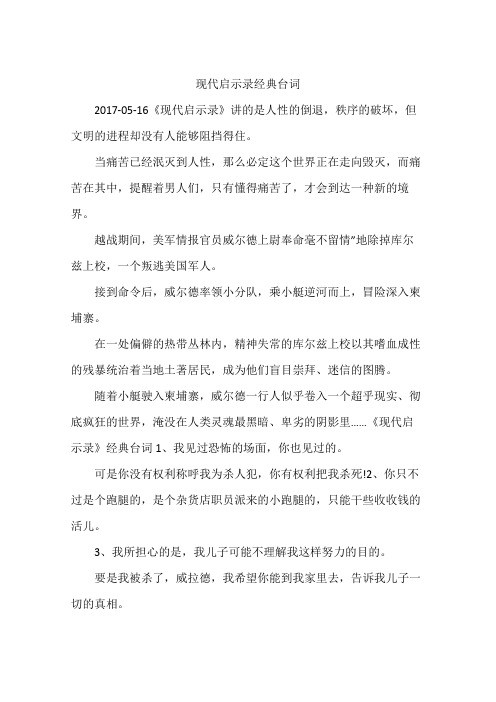
现代启示录经典台词2017-05-16《现代启示录》讲的是人性的倒退,秩序的破坏,但文明的进程却没有人能够阻挡得住。
当痛苦已经泯灭到人性,那么必定这个世界正在走向毁灭,而痛苦在其中,提醒着男人们,只有懂得痛苦了,才会到达一种新的境界。
越战期间,美军情报官员威尔德上尉奉命毫不留情”地除掉库尔兹上校,一个叛逃美国军人。
接到命令后,威尔德率领小分队,乘小艇逆河而上,冒险深入柬埔寨。
在一处偏僻的热带丛林内,精神失常的库尔兹上校以其嗜血成性的残暴统治着当地土著居民,成为他们盲目崇拜、迷信的图腾。
随着小艇驶入柬埔寨,威尔德一行人似乎卷入一个超乎现实、彻底疯狂的世界,淹没在人类灵魂最黑暗、卑劣的阴影里……《现代启示录》经典台词1、我见过恐怖的场面,你也见过的。
可是你没有权利称呼我为杀人犯,你有权利把我杀死!2、你只不过是个跑腿的,是个杂货店职员派来的小跑腿的,只能干些收收钱的活儿。
3、我所担心的是,我儿子可能不理解我这样努力的目的。
要是我被杀了,威拉德,我希望你能到我家里去,告诉我儿子一切的真相。
4、告诉他我所做的一切,告诉他你所看到的一切,因为我最痛恨有人撒谎了。
威拉德,要是你能理解我,你会为我这么去做的。
《现代启示录》影评《现代启示录》是弗朗西斯·福特·科波拉1979年拍摄的经典名作。
当时,受政治环境的影响以及为了迎合主流观众的胃口,该片曾删掉长达49分钟的内容。
20年后,科波拉在电视上收看这部旧作时,深感当时的顺从”给它带来的缺憾。
也许,经过这二十年的风云变幻,如今的观众已趋向成熟,可以承受当初大刀阔斧剪去的那些个性独特和带明显政治意味的情节。
于是,在科波拉的策划下,这部惊世之作终于恢复其本来面目。
果然,科波拉此举令观众大开眼界:新版《现代启示录》显得更为丰满、成熟。
不仅主题表达更加中肯、深切,其节奏、气氛也更加富于变幻,196分钟的放映时间于不知不觉中一晃而过,毫无臃肿拖沓之嫌。
该片情节框架大体取自英国作家约瑟夫·康拉德(josephconrad)的小说《黑暗之心》(heartofdarkness),只是对时代、背景和人物作了一番调换而已。
英语专八 英美文学 作品及作者简介
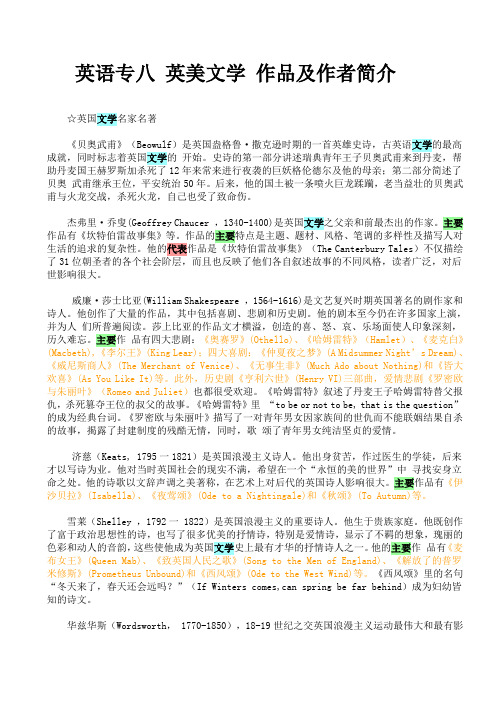
英语专八英美文学作品及作者简介☆英国文学名家名著《贝奥武甫》(Beowulf)是英国盎格鲁·撒克逊时期的一首英雄史诗,古英语文学的最高成就,同时标志着英国文学的开始。
史诗的第一部分讲述瑞典青年王子贝奥武甫来到丹麦,帮助丹麦国王赫罗斯加杀死了12年来常来进行夜袭的巨妖格伦德尔及他的母亲;第二部分简述了贝奥武甫继承王位,平安统治50年。
后来,他的国土被一条喷火巨龙蹂躏,老当益壮的贝奥武甫与火龙交战,杀死火龙,自己也受了致命伤。
杰弗里·乔叟(Geoffrey Chaucer ,1340-1400)是英国文学之父亲和前最杰出的作家。
主要作品有《坎特伯雷故事集》等。
作品的主要特点是主题、题材、风格、笔调的多样性及描写人对生活的追求的复杂性。
他的代表作品是《坎特伯雷故事集》(The Canterbury Tales)不仅描绘了31位朝圣者的各个社会阶层,而且也反映了他们各自叙述故事的不同风格,读者广泛,对后世影响很大。
威廉·莎士比亚(William Shakespeare ,1564-1616)是文艺复兴时期英国著名的剧作家和诗人。
他创作了大量的作品,其中包括喜剧、悲剧和历史剧。
他的剧本至今仍在许多国家上演,并为人们所普遍阅读。
莎上比亚的作品文才横溢,创造的喜、怒、哀、乐场面使人印象深刻,历久难忘。
主要作品有四大悲剧:《奥赛罗》(Othello)、《哈姆雷特》(Hamlet)、《麦克白》(Macbeth),《李尔王》(King Lear);四大喜剧:《仲夏夜之梦》(A Midsummer Night’s Dream)、《威尼斯商人》(The Merchant of Venice)、《无事生非》(Much Ado about Nothing)和《皆大欢喜》(As You Like It)等。
此外,历史剧《亨利六世》(Henry VI)三部曲,爱情悲剧《罗密欧与朱丽叶》(Romeo and Juliet)也都很受欢迎。
heart of darkness《黑暗之心》

Outline
Author Background Main Content Understanding of Mine
Author
Joseph Conrad(3 Dec. 18573 Aug.1924) was a Polishborn English novelist. He is regarded as one of the greatest novelists in the 20th century of the U.K. He wrote stories and novels, predominantly with a nautical(航海的) setting, that depict(描述) trials of the human spirit by the demands of duty and honor.
Understanding of Mine
His philosophy of life A warning to “civilized” human beings
An exploration of human nature
Main Content
The story centres on Charles Marlow, who narrates most of the book. He is an Englishman who takes a foreign assignment from a Belgian trading company as a riverboat captain in Africa. Heart of Darkness exposes the dark side of Belgian colonization(殖民化) while exploring the three levels of darkness that the protagonist(主角), Marlow, encounters(遭遇): the darkness of the Congo wilderness, the darkness of the Belgian’s cruel treatment of the African natives, and the unfathomable(深不可测的) darkness within every human being for committing heinous(可憎的) acts of evil.
黑暗之心读后感英文200词

The symbolism in heart of darknessHeart of Darkness:The novel has told the experience of capital Marlowe who was employed by a Belgium trading company. His task was to enter the interior Africa to save the very ill trading station agent Kurt. The so-called trade company is nothing but wanting to conquer the African land on the name of trade. The story of Marlowe start with his segment of the contract to go to Congo, and the climax of the story is Marlowe’s meet with Karts. With Marlowe’s further in, another hero – karts slowly came into our vision. Although in the jungle, Marlowe have understood what is wildness and what is horror, this afeard degree is far beneath from which Karts brings . In Marlowe’s heart, Karts is somehow a threat for he is come here to replace. The further he went, the more he feels about that .the more he know things about Karts, the more apparent his uneasy is At first, Karts is an energetic young man with lofty ideal. He once dreams he can find his fortune in Africa, to realize his own value. what attracted him to Africa is ―to have h igher wisdom ,an extensive sympathy and a concentrated aim……‖Karts can be called the whole European’s represent a half English and a half French, so we can say, the whole European is devoted itself to the growth of Karts. He is the symbol of the European civilization. However, the bad natural environment of the colony and the rich material benefits made him a people blinded of greed. The interest and desire have eroded him. And for a long time, he dead on the ship back Europe.Symbolism of racism was the first thing that stood out while reading this story. This idea came from the way that Joseph Conrad wrote about the whites, - who were considered ―civilized‖, and how they treated the blacks –who were considered ―uncivilized‖, in Africa. During the settlement and colonization of Africa, the whites thought themselves to be superior to any human who was different from their color (i.e. Natives). This is well shown when Marlow described his first impression of Africa, when he saw the ―Black shapes crouched…The work was going on…this was the place where some of the helpers had withdrawn to die…they were nothing earthly now, nothing but black shadows of disease and starvation, lying confusedly in the gre enish gloom.‖ These Natives were not ―helpers‖, but slaves w ho were forced to work under the order of the white settlers.However, Joseph Conrad's Heart of Darkness is more than a mere exploration of the harsh realities of European colonialism in Africa .In fact; it is rich in symbolism as demonstrated by his negativeportrayal of women. To him, women were nothing more than soft, delicate, and naive. Many critics say Conrad is a person who hate woman, in the heart of darkness, Conrad use a regressive way to describe woman, the female role of canard reflected his old idea of woman. ―Then – would you believe it?—I tried the women.I Charlie Marlow, set the women to work – to get a job. Heavens! ‖In Marlow’s heart , women seems have no value ,he thought that he make use of a woman is a shameful act .In this story, darkness was not only shown through the disturbing acts of racism, but was also shown as an unforgiving force that eventually drove all of the characters to drop the holds of society and civilization and showed through their actions. At the same time, its negative portrayal of women is also an apparent symbolism in the heart of darkness. However, Conrad's condemnation of women is no longer a valid interpretation of women in the 21st century; thus, we must overlook Conrad's invalid judgment of women and take a modernistic approach in scrutinizing the women's actual representation in Heart of Darkness.。
浅析现代英国文学中的动物形象

ENGLISH ON CAMPUS2023年33期总第681期浅析现代英国文学中的动物形象摘 要:动物形象在文学作品中常被视为一种象征、隐喻或寓言的手法,它们可以代表人类的特质、情感和社会问题。
通过对一些具有代表性的英国文学作品进行分析和解读,可以发现动物形象在文学中的多重意义和作用。
本文从不同的角度出发,探讨动物形象在现代英国文学中的象征意义、情感表达以及社会批判等方面的表现。
通过对这些动物形象进行深入解读,读者可以更好地理解现代英国文学作品中所传递的人类关系、道德观念以及社会问题,同时也能够欣赏文学作品中独特而生动的艺术表达。
关键词:现代英国文学;动物形象;象征手法;文学创作作者简介:杨帅,王瑜洁,张安琦,河北师范大学。
动物作为文学创作中常见的形象之一,在现代英国文学中也占据着重要地位。
它们以自己独特的方式参与到文学作品的构建中,不仅是故事情节的推动者,更是象征和隐喻的载体。
动物形象在文学作品中可以展现出人性的各种特质和情感,同时也通过对动物与人类的关系的描绘,反映出社会问题和价值观念。
本文对这些方面展开探讨,希望能够帮助相关读者深入理解动物形象在现代英国文学中的表现形式和意义,从而更好地欣赏和理解这些文学作品所传递的思想和情感。
一、现代英国文学的特点和背景现代英国文学是指从20世纪初至今的英国文学创作,涵盖了丰富多样的文学流派和风格。
其特点在于多元性、实验性和反思性。
20世纪初,英国文学迎来了现代主义的浪潮,作家们开始挑战传统文学形式和观念,探索新的艺术表达方式。
随后,英国文学经历了战争、社会变革和全球化的影响,作家们开始关注社会问题、身份认同和个体经验的表达。
现代英国文学以其对语言和形式的创新而闻名,作家们尝试着破除传统的叙事结构和线性时间观念,运用流派交错、多声部叙述和碎片化的手法来呈现复杂的主题和思想。
同时,他们也对社会现实进行了深刻的审视和批判,关注种族、阶级、性别、政治和环境等话题,展现了对社会问题的关注和反思。
人与自然命运共同体——《黑暗之心》的深层生态学解读

收稿日期:2020-10-14深层生态学从理论上说明了人类与他们所存在的世界之间的紧密关联,其强调了自然本身的、独立于人类社会功能之外的价值。
约瑟夫·康拉德(Joseph Conrad )的《黑暗之心》为我们展现了非洲大陆腹地刚果地区的景观。
在行程中,马洛对库尔茨的情感经历了数次变化,其灵魂深处的矛盾通过荒野与自我反思得以展现。
最终,库尔茨为荒野所震慑,对“自我实现”的真正价值有了新的认识,马洛也对自然产生共鸣,开始了内心救赎。
所以,从深层生态学的角度去解读《黑暗之心》,解读人与地方环境的界限等问题,有利于我们重新思考人与自然的关系问题。
1 深层生态学的定义和内涵深层生态学起源于20世纪70年代兴起的一场哲学运动,由挪威哲学家阿伦·奈斯(Arne Naess )于1973年正式提出。
Naess (1995:79)指出:“我认为,最大限度的自我实现就需要最大限度的多样性和共生。
多样性是一条基本原则。
”这里的自我实现不再局限于将人从自然中分离,并致力于实现个人价值的“小我”,而是转变成保持人与自然多样性共生的“大我”。
这才是真正意义上的自我实现,也是人类成熟的方式。
深层生态学主张彻底摒弃破坏性的意识人与自然命运共同体——《黑暗之心》的深层生态学解读□ 明倩倩南通大学外国语学院[摘 要] 《黑暗之心》是英国作家康拉德最负盛誉的作品之一。
小说描写了马洛在寻找库尔茨的过程中的所见所闻,突出反映了欧洲文明所代表的殖民主义与非洲原始土地的矛盾与冲突。
本文从深层生态学视角出发,通过分析库尔茨与生态智慧T的关联及深层生态意识在主人公内心深处的矛盾体现,揭示出《黑暗之心》所蕴含的人类与自然环境间相互渗透和相互依存的深层生态学关联。
[关键词] 《黑暗之心》;康拉德;深层生态学;生态智慧T;深层生态意识[中图分类号] I106 [文献标识码] A [文章编号] 1009-6167(2021)07-0009-03形态,呼吁恢复美洲土著文化中的“地球智慧”。
heartofdarkness《黑暗的心》读书报告
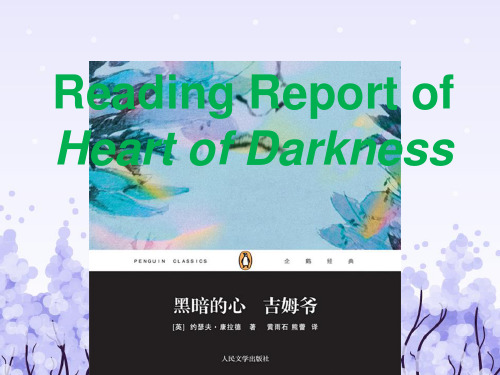
4. Style
1). Conrad’s prose is a difficult animal to wrestle. It seems long-winded and tedious, but is surprisingly poetic. 2). Although Heart of Darkness is rather short, it seems like a long read because there is surprisingly little action. 3). The text is very cerebral – that is, much of it happens inside Marlow’s head.
Kurtz’s African mistress:A beautiful woman loaded with jewelry who appears on the shore when Marlow’s steamer arrives at and leaves the Inner Station. She seems to exert an undue influence over both Kurtz and the natives around the station. Like Kurtz, she is an enigma: she never speaks to Marlow, and he never learns anything more about her.
6.3 Journey into the Self
Heart of Darkness is structured as a journey of discovery, both externally in the jungle, and internally in Marlow’s own mind. The deeper he penetrates into the heart of the jungle, the deeper he explores within himself; by the climax, when Kurtz has been revealed for the disgrace he is, Marlow has also learned something about himself. And he returns to civilization with this new knowledge.
Heart of darkness-theme (黑暗之心)
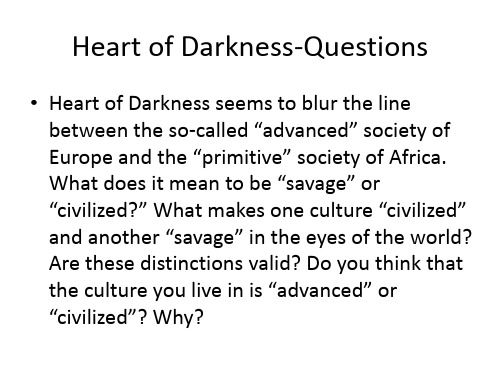
Rome in Caesar’s time
England under Elizabeth I
African Chieftan
Civilization vs. Savagery
Marlow said, "And this (England) also has been one of the dark places of the earth.“ This can be read three ways. 1. “Western” civilization is just as barbarous as African civilizations. 2. It is as a reference to the historical precedent for colonization of other peoples. 3. Civilization must be learned.
Pictures: [PPT] HEART OF DARKNESS - Coweta County Schools
Civilization vs. Savagery
Civilization is superficial : -- The level of civilization is related to the physical and moral environment.
* While sociencies, it does not get rid of them.
Light vs. Darkness
Darkness: death; ignorance; inability; the incomprehensible; the unknowable; negative force etc.→ the opposite to the Victorian era's ideals of progress --e.g. Marlow finds this brute force not only exits in the jungles of the Congo, but also in advanced society.
- 1、下载文档前请自行甄别文档内容的完整性,平台不提供额外的编辑、内容补充、找答案等附加服务。
- 2、"仅部分预览"的文档,不可在线预览部分如存在完整性等问题,可反馈申请退款(可完整预览的文档不适用该条件!)。
- 3、如文档侵犯您的权益,请联系客服反馈,我们会尽快为您处理(人工客服工作时间:9:00-18:30)。
Pictures: [PPT] HEART OF DARKNESS - Coweta County Schools
Light: bright; knowledge; capable in every field; life; perfection etc. --e.g. The civilized people possessing the light are able to save African people from darkness. White is not necessarily good (ivory a symbol of greed), Black not necessarily evil (suffering)
Civilization vs. Savagery
Civilization is superficial : -- The level of civilization is related to the physical and moral environment.
* While society seems to restrain these savage tendencies, it does not get rid of them.
Heart of Darkness-Questions
• Heart of Darkness seems to blur the line between the so-called “advanced” society of Europe and the “primitive” society of Africa. What does it mean to be “savage” or “civilized?” What makes one culture “civilized” and another “savage” in the eyes of the world? Are these distinctions valid? Do you think that the culture you live in is “advanced” or “civilized”? Why?
Civilization vs. Savagery
Civilization is a cycle.- Rome conquers Europe, Europerlow said, "And this (England) also has been one of the dark places of the earth.
Civilization vs. Savagery
Civilization acts as a buffer : -- to prevent men from reverting back to their darker tendencies -The tendency to revert to savagery is seen in Kurtz. -- representing what every man will become if left to his own intrinsic desires without a protective, civilized environment -The civilized soul that has not been drawn back into savagery is seen in Marlow. Every man has a heart of darkness that is usually drowned out by the light of civilization.
Rome in Caesar’s time
England under Elizabeth I
African Chieftan
Civilization vs. Savagery
Marlow said, "And this (England) also has been one of the dark places of the earth.“ This can be read three ways. 1. “Western” civilization is just as barbarous as African civilizations. 2. It is as a reference to the historical precedent for colonization of other peoples. 3. Civilization must be learned.
References
Content: /heart-of-darkness/themes.html /lit/heart/themes.html /heart-of-darkness/studyguide/major-themes/ https:///sites/hsiraponian/Shared%20Docu ments/Heart%20of%20Darkness%20Theme%20and%20S ymbols.pdf
Absurdity of Evil
Marlow’s struggle to maintain his sense of morality Marlow's desire to be good and do good becomes increasingly futile as he's plunged into a world where no absolute goodness exists. Conrad illustrates this moral ambiguity with light and darkness imagery that often blends together.
Light vs. Darkness
Darkness: death; ignorance; inability; the incomprehensible; the unknowable; negative force etc.→ the opposite to the Victorian era's ideals of progress --e.g. Marlow finds this brute force not only exits in the jungles of the Congo, but also in advanced society.
